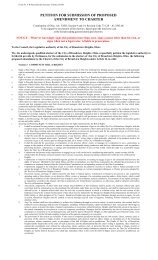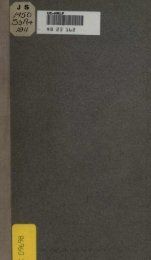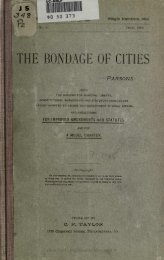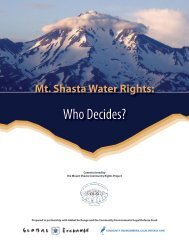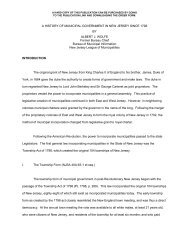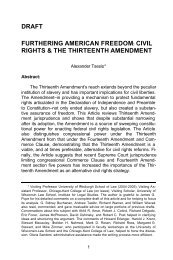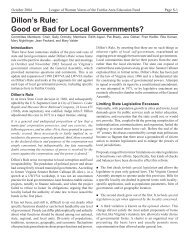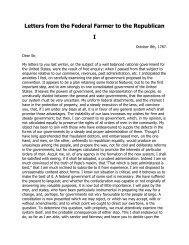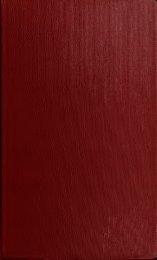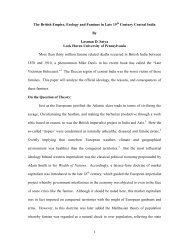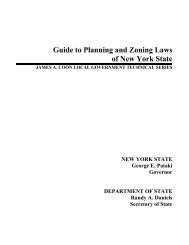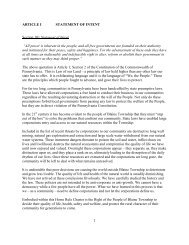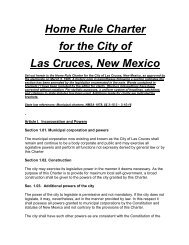Connecticut - The Community Environmental Legal Defense Fund
Connecticut - The Community Environmental Legal Defense Fund
Connecticut - The Community Environmental Legal Defense Fund
- No tags were found...
Create successful ePaper yourself
Turn your PDF publications into a flip-book with our unique Google optimized e-Paper software.
Gyu vLFShopping for HouseholdCleaning ProductsWHAT TO LOOK FOR:No phosphatesSolvent-freePhosphate-free, chlorine-freedishwasher detergentManufacturers with a proven trackrecord in nontoxic productsProducts that fully disclose ingredientsand prove themselves greenNo petroleum-based ingredientsFor paper products:PVC-freeReduced and recyclable packaging100% recycled, with a high PCR (postconsumerrecycled) contentWhitened without chlorine bleach,totally chlorine free (TCF), orprocessed-chlorine free (PCF)Bulk products to avoid repurchasingbottles and containersWHAT TO AVOID:Products with the words “Danger,”“Caution,” “Warning,” “Poison,” or“Fatal if swallowed” on the labelAll conventional cleaning products,especially drain cleaners, ovencleaners, acid-based toilet bowlcleaners, fabric softeners, anddryer sheetsProducts that do not list theingredients on the labelProducts with vague andmisleading labels, such as“Natural” with no ingredient listArtificial scents and fragrancesAir fresheners and deodorizersFake “aromatherapy”Excessive packagingPVC packagingfor safety—another reason to go fornatural alternatives.<strong>The</strong> artificial fragrances added to allmanner of conventional household productsprovide further impetus to avoidthem. Of all the substances the fragranceindustry uses, one-third areknown to be toxic, according to theNational Institute of Occupational Safetyand Health. Again, that doesn't meanthe other two-thirds are safe; many havenever been tested. All chemicals used tocreate a product's aroma are hidden inthe ingredient list simply as “fragrance,”if listed at all.Vague claims on the label such as“nontoxic”, “biodegradable” (if it doesn'tsay how long, the term may be meaningless),“natural”, “organic”, and“eco-friendly” don't ensure that you aregetting a green product and may indicatea company that is hoping to slip theirnon-green product past the unwary consumerand cash in on the green bonanza.As conscious consumers, we can helpset the standard! Let's say no right nowto vague and misleading labeling andonly buy cleaning products that fully disclosewhat they contain and prove themselvesgreen. As a start, look forspecifics such as “no phosphates,” “solvent-free,”or “no petroleum-basedingredients.” Seventh Generation and Dr.Bronner's are two product lines that providesafer, greener cleaning options. Oryou can avoid the whole cleaning productdilemma and make your own fromsimple and readily available ingredientssuch as baking soda, vinegar, borax, salt,and lemon juice. By making your own,you also avoid the purchase of plasticcontainers that have added poisons tothe environment in their making and willadd more in their disposal, whether theyare recycled or dumped in the landfill.For natural cleaning recipes to useinstead of the toxic cleaning agentscovered in the following sections, seeecomall.com/greenshopping/checnet.htm andgreenaction.org/toxics/home/index.shtml.Corrosives and SolventsNumerous sources cite drain cleaners,oven cleaners, and acid-based toiletbowl cleaners as the three most dangerouscommon household cleaning products.<strong>The</strong>y come with a danger warningbecause they are corrosives, meaningthey can burn your eyes, skin, andinsides (if swallowed). <strong>The</strong>y also producea toxic gas when combined with otherproducts, such as chlorine bleach. Can aproduct that will burn your eyes and skinor be fatal if ingested be good for theenvironment, either in the making of itor sending it down the drain and intothe water table? Again, with commercialor homemade green alternativesavailable, there is no reason to foolaround with products that tell youstraight out—DANGER.Disinfectants<strong>The</strong>se are the cleaning products that killbacteria. <strong>The</strong>y typically contain chlorinebleach (see Laundry, p. 30), ammoniaconjugates, phenols, and/or triclosan, allof which can cause health problems. <strong>The</strong><strong>Environmental</strong> Protection Agency (EPA)classifies disinfectants as pesticides.Hmm, what does this tell you? In thecase of triclosan, which is found in manyhand soaps, it closely resembles thechemical structures of an herbicide aswell as the most toxic form of dioxin; itis also a suspected hormone disrupter.Two common phenols (phenol, coveredunder Poisons, is chemically the simplestof these compounds) used in disinfectantsare chlorophenols, which aretoxic water pollutants, and phenylphenols,suspected carcinogens. As forammonia, it is a respiratory irritant andits conjugates found in cleaning productscan cause asthma. Cleaning your house…in the greenfrenzy now upon us,consumers maynot be getting theenvironmentally soundproduct they thinkthey are.regularly with natural products, washingyour hands frequently with natural soap,and keeping your immune systemstrong are better defenses againstgerms than poisoning your family andyourself with toxic disinfectants. Andremember, everything you send downthe drain ends up in the world's water.Toilet Bowl CleanersAutomatic toilet bowl cleaners comewith these kinds of warnings on thelabel: Highly corrosive, may be fatal ifswallowed, causes eye and skin damage,irritating to nose and throat, avoidbreathing dust. Some companies proudlyadvertise the addition of “air freshening”(see the following) to the chlorinecleaning function. Others boast thattheir product is effective for up to fourmonths. Imagine the extra-strong chemicalsneeded to accomplish that! Cananything that grows in the toilet be asbad as breathing the toxic chemicalsthese automatic cleaners release intoyour indoor air 24/7? Wouldn't you dobetter to clean the toilet yourself, usinga natural product?Air FreshenersWow, do you really want to freshen yourair with formaldehyde and ethylenebasedglycol ethers? <strong>The</strong>se are only twoof the many chemicals that air freshenersand air deodorizers contain, sans anyFEATURES16THE NATURAL PAGES ® 0 MARCH-AUGUST 20085 TELL THEM YOU FOUND THEM IN THE CONNECTICUT NATURAL PAGES!17



